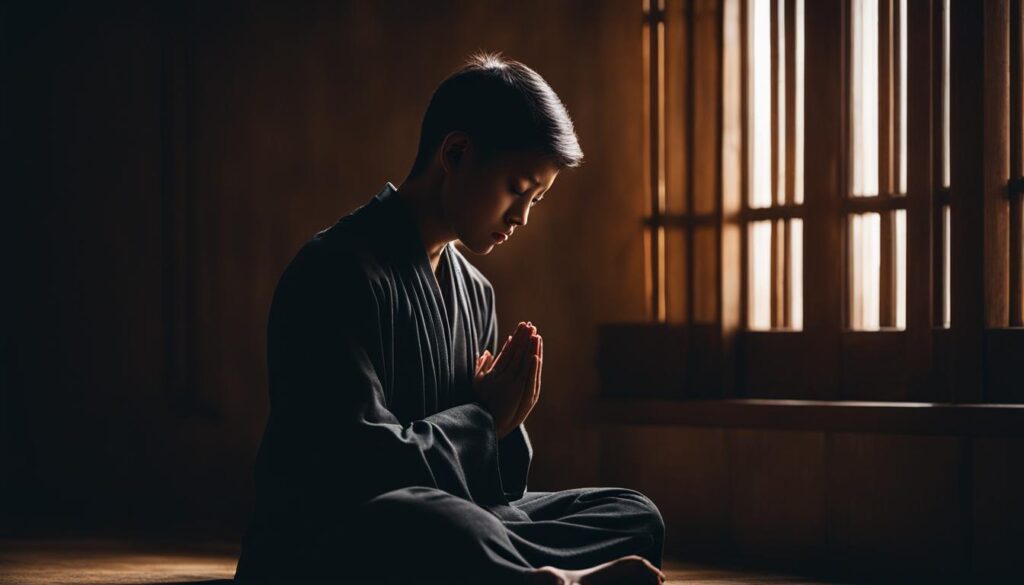According to various sources, the effectiveness of prayers does not depend on the duration of prayer. While some people believe that longer prayers are more powerful, others argue that short, meaningful prayers can be just as effective. It is important to note that prayer is a personal and subjective practice, and its effectiveness may vary for each individual.
Key Takeaways:
- Prayer effectiveness is not determined by its duration.
- Short, meaningful prayers can be just as effective as longer prayers.
- Prayer is a personal and subjective practice.
- Jesus emphasized the importance of meaningful and sincere prayers.
- Consistency in prayer practice is more important than duration.
The Misconception of Long Prayer Blocks
Many people have the misconception that prayer must be done in a long block of time, usually in the morning. However, the concept of “pray without ceasing” suggests that prayer can happen at any time throughout the day, in any duration. Longer prayers may have benefits of deeper reflection and connection with a higher power, while short prayers can be powerful in specific situations and moments of need.
It is essential to understand that the duration of prayer does not necessarily determine its effectiveness. Whether a prayer is long or short, what matters most is the sincerity, intention, and connection with a higher power. Longer prayers can provide an opportunity for extended contemplation, self-reflection, and a deeper connection with one’s spirituality. On the other hand, short prayers can serve as powerful tools for seeking guidance, expressing gratitude, and finding solace in times of distress.
“Prayer is not asking. It is a longing of the soul.” – Mahatma Gandhi
Prayer is a deeply personal and subjective practice, and individuals may find that their prayer preferences and experiences vary. Some may feel a profound sense of peace and connection during longer prayer sessions, while others may find that shorter, spontaneous prayers align more closely with their personal style and needs. The power of prayer lies not in its duration, but in the authenticity and intention behind it.
| Benefits of Longer Prayers | Power of Short Prayers |
|---|---|
| – Deeper reflection | – Quick connection in moments of need |
| – Extended contemplation | – Guidance-seeking |
| – Connection with higher power | – Expressing gratitude |

Ultimately, the effectiveness of prayer is not measured solely by its duration, but by the genuine connection and communication it fosters with a higher power. Whether one chooses to engage in longer prayers for deep introspection or shorter prayers for immediate solace, the key is to find a prayer practice that resonates with the individual’s spiritual journey and brings them closer to their faith.
Jesus’ Teaching on Prayer Length
When it comes to prayer, many people wonder about the importance of its duration. In this section, we will explore Jesus’ teachings on prayer length and how it relates to its effectiveness. According to the Bible, Jesus criticized the idea of piling up empty phrases and emphasized the significance of sincere and meaningful prayers. Let’s dive deeper into what Jesus had to say about prayer duration.
The Importance of Meaningful and Sincere Prayers
In Matthew 6:7-8, Jesus warns against using “empty phrases” and encourages his followers to pray with sincerity and intention. He emphasizes that God already knows what we need before we even ask. This highlights the idea that prayer is not about how long we pray, but rather the depth of our connection and the authenticity of our prayers. It is not the duration that determines the effectiveness of our prayers, but rather the heart behind them.
An Example of a Short, Meaningful Prayer
Jesus provides an example of a concise yet powerful prayer in Matthew 6:9-13. This prayer, commonly known as the Lord’s Prayer, is a model for believers to follow. It consists of only a few sentences but encompasses various aspects of a meaningful prayer, including praise, acknowledgment of God’s will, request for daily provision, forgiveness, and deliverance from temptation. This example further emphasizes that prayer does not have to be long and elaborate to be effective.
| Key Points | Jesus’ Teaching on Prayer Length |
|---|---|
| Duration | Not the determining factor of prayer effectiveness |
| Sincerity and Intention | Emphasized by Jesus as essential in prayer |
| Example of a Short, Meaningful Prayer | The Lord’s Prayer as a model for believers |
Based on Jesus’ teachings, it is evident that the length of prayer does not hold significance in determining its effectiveness. What matters most is the sincerity, intention, and authenticity with which we approach our prayers. Whether it is a few moments or an extended period, connecting with a higher power through meaningful and heartfelt prayers is what truly matters.

Consistency in Prayer Practice
Consistency is key when it comes to prayer practice. It is not about the length of time spent in prayer, but rather the regularity and commitment to incorporating prayer into our daily lives. Establishing regular prayer habits can have a profound impact on our spiritual growth and connection with a higher power.
Creating a dedicated time for prayer each day allows us to cultivate a deeper intimacy with God and develop a sense of discipline in our spiritual journey. Whether it’s a few minutes in the morning, a prayer break during lunchtime, or a moment of reflection before bedtime, the consistency of our prayer practice strengthens our faith and helps us stay connected to our divine source.
Prayer consistency also provides a space for us to express our gratitude, seek guidance, and find solace during challenging times. It serves as a constant reminder of our reliance on a higher power and helps us maintain a sense of peace and calm amidst the busyness of life.
Benefits of Consistent Prayer
Consistent prayer allows us to develop a deeper understanding of ourselves and our relationship with God. It opens up avenues for self-reflection, introspection, and spiritual growth. When we make prayer a habit, we become more attuned to the voice of God and the subtle guidance we receive.
Furthermore, consistent prayer helps us align our thoughts, intentions, and actions with our spiritual beliefs. It serves as a constant reminder to live our lives in accordance with the values and teachings we hold dear. As we cultivate a consistent prayer practice, we become more mindful of our choices and strive to lead a life that is in harmony with our faith.
| Benefits of Consistent Prayer: | Summary: |
|---|---|
| 1. Deepens spiritual growth and connection with God | Prayer consistency fosters a closer relationship with a higher power, allowing for personal growth and spiritual development. |
| 2. Provides a space for gratitude and guidance | Regular prayer habits enable us to express gratitude, seek guidance, and find solace during challenging times. |
| 3. Enhances self-reflection and introspection | Consistent prayer facilitates self-reflection, leading to a deeper understanding of ourselves and our relationship with God. |
| 4. Aligns thoughts, intentions, and actions with faith | Through regular prayer, we become more mindful of our choices and strive to live in accordance with our spiritual beliefs. |
The Art of Personalized Prayers
Prayer is a deeply personal and individualized practice, allowing individuals to connect with a higher power on a personal level. Each person’s prayer style may vary based on personal preferences and circumstances, reflecting their unique spiritual journey. Some individuals find solace in longer, more formal prayers, while others resonate with short, spontaneous prayers. Regardless of the length, the key is to embrace a prayer style that feels authentic and meaningful.
Personalized prayers can take many forms, such as reciting traditional prayers, engaging in silent meditation, or speaking from the heart in one’s own words. The beauty of personalized prayers lies in their ability to be tailored to individual needs, expressing thoughts, emotions, and intentions directly to the divine. This customization fosters a deep sense of connection and intimacy with a higher power, enhancing the spiritual experience.
Incorporating various elements into personalized prayers can also add depth and meaning. Some individuals may choose to incorporate scripture verses or hymns into their prayers, while others may find comfort in using prayer beads or engaging in specific body postures. These practices can help create a focused and intentional prayer experience, deepening the connection with the divine.
Benefits of Personalized Prayers
Personalized prayers offer a multitude of benefits to individuals on their spiritual journey. Firstly, they allow for a deeper sense of authenticity and sincerity, as one communicates openly and honestly with a higher power. This level of vulnerability fosters a stronger sense of trust and intimacy in the prayer relationship.
Secondly, personalized prayers provide a sense of empowerment and ownership over one’s spiritual life. By crafting prayers that reflect personal desires, struggles, and gratitude, individuals actively participate in their own spiritual growth and development. This active engagement strengthens faith and nurtures a sense of personal responsibility for one’s relationship with a higher power.
Finally, personalized prayers can offer a greater sense of flexibility and adaptability. Individuals can tailor their prayers to specific situations, needs, and emotions, allowing for a more dynamic and responsive prayer life. This flexibility enables prayer to become an ever-present companion throughout life’s journey, offering comfort, guidance, and strength in times of joy, sorrow, and uncertainty.
| Benefits of Personalized Prayers |
|---|
| Deeper sense of authenticity and sincerity |
| Empowerment and ownership over spiritual life |
| Greater flexibility and adaptability |

Prayer as an Expression of Faith

Prayer is a powerful and meaningful way for individuals to express their faith and connect with a higher power. It is a deeply personal practice that allows believers to communicate their hopes, fears, and gratitude, fostering a sense of connection and spiritual growth. The frequency of prayer plays a significant role in this expression of faith.
“Prayer is not asking. It is a longing of the soul. It is a daily admission of one’s weakness. It is better in prayer to have a heart without words than words without a heart.” – Mahatma Gandhi
The Power of Prayer Frequency
While the duration of prayer is important, it is the consistency of prayer practice that truly strengthens one’s faith. Regular prayer creates a habit of turning to a higher power, seeking guidance, and finding solace in moments of joy and struggle. It is through consistent prayer that individuals experience a deepening connection and build a strong foundation for their spiritual lives.
Prayer frequency can vary from person to person. Some may find comfort and peace in daily prayers, while others may choose to pray multiple times throughout the day. The important aspect is the sincerity and intention behind each prayer, as it is the genuine expression of faith that matters most.
The Benefits of Prayer
Prayer offers numerous benefits beyond just expressing faith. It provides a space for self-reflection and introspection, helping individuals find clarity and peace of mind. Prayer can also serve as a source of strength and comfort during challenging times, serving as a reminder of hope and resilience.
Additionally, prayer can foster a sense of community and belonging. Many religious traditions involve communal prayers, where believers come together to pray as a united front. This shared experience creates a sense of connection and support, strengthening one’s faith through collective worship.
| Prayer Frequency | Benefits |
|---|---|
| Daily prayers | Consistent spiritual growth, a sense of peace and guidance |
| Multiple prayers throughout the day | Constant connection with a higher power, heightened awareness of faith in daily life |
The table above highlights some of the benefits associated with different prayer frequencies. It is important to note that the benefits of prayer extend beyond its duration or frequency, emphasizing the importance of prayer as an expression of faith.
Different Types of Prayer

The practice of prayer takes various forms and can be both oral and silent. Different types of prayer serve different purposes and allow individuals to connect with a higher power in different ways. Understanding the different types of prayer can help individuals find a prayer style that resonates with them personally.
Oral Prayer
Oral prayer involves speaking or reciting prayers aloud. This type of prayer can be done individually or in a group setting, such as during religious services or gatherings. Oral prayers can be formal, following a structured format and traditional language, or they can be spontaneous and heartfelt, using one’s own words to communicate with a higher power. Some examples of oral prayers include prayers of thanksgiving, prayers of petition, and prayers of intercession. Oral prayers allow individuals to express their thoughts, emotions, and needs verbally, offering a sense of connection and communication.
Silent Prayer
Silent prayer, as the name suggests, involves praying in silence, without speaking or vocalizing prayers. This type of prayer focuses on inner reflection, meditation, and listening for guidance or messages from a higher power. Silent prayers can be practiced individually or in a group, with the focus being on quieting the mind and being present in the moment. Silent prayer allows individuals to connect with their inner selves and deepen their spiritual awareness. It can be a time for personal reflection, contemplation, and seeking guidance without the need for words.
Both oral and silent prayers have their own benefits and can be used in combination or separately, depending on one’s personal preferences and spiritual needs. Exploring different types of prayer and finding what resonates with each individual can enhance the prayer experience and deepen one’s connection with a higher power.
Personal Experiences with Prayer
Prayer has been a deeply personal and transformative experience for many individuals. It is a time of connection, reflection, and seeking guidance from a higher power. Through their individual prayer experiences, people have reported experiencing a spiritual flow, a sense of peace, and a strengthened connection with their faith.
For some, prayer becomes a regular practice that helps them maintain a constant awareness of God’s presence throughout the day. These individuals often find solace in praying multiple times, even with short prayers, as they believe it keeps them grounded and attuned to their spirituality. It becomes a way of aligning their thoughts, actions, and desires with their faith.
On the other hand, some individuals prefer longer periods of prayer for deeper reflection and communion. They carve out dedicated time to engage in prayer, allowing themselves to delve into introspection and connect with their spiritual beliefs on a more profound level. These extended prayer sessions provide an opportunity for self-examination, gratitude, and seeking answers to life’s challenges.
“Prayer is not asking. It is a longing of the soul. It is a daily admission of one’s weakness. It is better in prayer to have a heart without words than words without a heart.” – Mahatma Gandhi
Regardless of the duration or frequency of prayer, the common thread among these personal experiences is the spiritual flow that individuals encounter. It is a sense of being in harmony with their faith, finding solace and strength in their connection with a higher power. The spiritual flow experienced through prayer is unique to each individual, shaping their understanding of the divine and their personal journey of faith.
| Benefits of Short Prayers | Benefits of Longer Prayers |
|---|---|
|
|
Ultimately, it is the individual’s connection, intention, and sincerity behind their prayers that define the effectiveness and impact of their personal prayer experiences. Whether it is through shorter, more frequent prayers or longer, dedicated prayer sessions, individuals find solace, growth, and a sense of purpose in their spiritual journey.
Prayer as an Essential Practice
Prayer holds immense importance in numerous religious traditions as a fundamental practice for building a spiritual life and deepening one’s faith. It serves as a means to connect with a higher power, seek guidance, and express gratitude. Regardless of the duration or frequency of prayer, it is the intention, sincerity, and personal connection that determine its impact.
Through regular prayer, individuals embark on a personal journey that brings comfort, growth, and a sense of purpose. It establishes a pathway to develop a stronger relationship with the divine and foster a deeper understanding of oneself. The act of prayer cultivates a space for introspection, spiritual reflection, and communion with a higher power.
While prayer may vary in form and duration, its essence lies in the expression of faith. It is an opportunity to articulate beliefs, hopes, and desires, fostering a sense of connection and dependence on the divine. Prayer allows individuals to acknowledge their vulnerabilities, seek solace in times of adversity, and offer gratitude for the blessings received.
As each person’s prayer journey is unique, there is no rigid template or prescribed formula for an effective prayer. It is a deeply personal practice that evolves and adapts to individual needs and circumstances. Whether through lengthy and meticulously crafted prayers or brief and spontaneous utterances, the power of prayer lies in the authenticity and heartfelt intention behind it.
In essence, prayer serves as a vital pillar in the construction of a spiritual life. It provides solace, guidance, and a source of strength for individuals seeking to deepen their faith and find solace in the divine presence. Regardless of the form, duration, or frequency, prayer nurtures a deep connection and fosters growth on the spiritual path.
Conclusion
In conclusion, the duration of prayers does not solely determine their effectiveness. Whether one opts for longer prayers or shorter prayers, what truly matters is the intention, sincerity, and personal connection with a higher power. Prayer is a deeply personal and subjective practice, and its power may vary for each individual.
The misconception that longer prayers are more powerful has been debunked. The concept of “pray without ceasing” highlights that prayers can take place at any time and in any duration throughout the day. Longer prayers may provide an opportunity for deeper reflection and connection, while shorter prayers can hold tremendous power in specific situations and moments of need.
In the Bible, Jesus himself taught that prayer’s effectiveness does not hinge on its length. He emphasized the importance of heartfelt, meaningful prayers over the accumulation of empty phrases. Jesus even exemplified the power of concise yet powerful prayers, reminding us that brevity does not diminish the impact of our words.
Ultimately, building a consistent prayer practice, regardless of the duration, is what matters. Regular prayer habits, integrated into our daily lives, can enhance spiritual growth and foster a stronger connection with a higher power. Remember, prayer is a personal journey, and finding an authentic and meaningful prayer style is key to nurturing our spiritual lives.
FAQ
Are longer prayers more effective than a short 5-second prayer?
The effectiveness of prayers does not solely depend on their duration. Both longer prayers and short prayers can be powerful and effective, depending on the intention, sincerity, and personal connection with a higher power.
What is the misconception of long prayer blocks?
Many people believe that prayer must be done in a long block of time, usually in the morning. However, the concept of “pray without ceasing” suggests that prayer can happen at any time throughout the day, in any duration. Longer prayers may have benefits of deeper reflection and connection with a higher power, while short prayers can be powerful in specific situations and moments of need.
What did Jesus teach about prayer length?
In the Bible, Jesus teaches that the length of prayer does not determine its effectiveness. He criticizes the idea of piling up empty phrases and emphasizes the importance of meaningful and sincere prayers. Jesus even provides an example of a short, meaningful prayer, showing that prayer can be concise yet powerful.
Why is consistency important in prayer practice?
Many religious leaders emphasize the importance of consistency in prayer practice. It is more crucial to have a regular habit of prayer, regardless of the duration. The New Testament encourages believers to pray always, integrating prayer into their daily lives. Having a dedicated time for prayer each day can enhance spiritual growth and connection with a higher power.
How can I personalize my prayers?
Prayer is a personal and individualized practice. The length of personal prayers can vary based on personal preferences and circumstances. Some individuals may find solace in longer, more formal prayers, while others may resonate with short, spontaneous prayers. The key is to embrace a prayer style that feels authentic and meaningful to each individual.
What does prayer express in terms of faith?
Prayer is an expression of faith and a way to communicate with a higher power. The frequency of prayer is more important than the duration. It is not about how long or how often one prays, but rather the sincerity and intention behind the prayers. Building a friendship with God through prayer can create a deep connection and strengthen one’s faith.
What are the different types of prayer?
Prayer takes various forms and can be both oral and silent. There are many different types of prayer, such as prayers of thanksgiving, intercessory prayers, and meditative prayers. Each individual can explore different prayer techniques and find what resonates with them personally.
How do individuals experience prayer?
Many individuals have experienced a spiritual flow and connection through prayer. Some find that praying multiple times throughout the day, even with short prayers, helps maintain a constant awareness of God’s presence. Others may prefer longer periods of prayer for deeper reflection and communion. Prayer experiences can vary greatly among individuals.
Why is prayer considered an essential practice?
Prayer is considered an essential practice in many religious traditions. It is a way to connect with a higher power, seek guidance, and express gratitude. Regular prayer is seen as a fundamental aspect of building a spiritual life and deepening one’s faith. It is a personal journey that can bring comfort, growth, and a sense of purpose.








